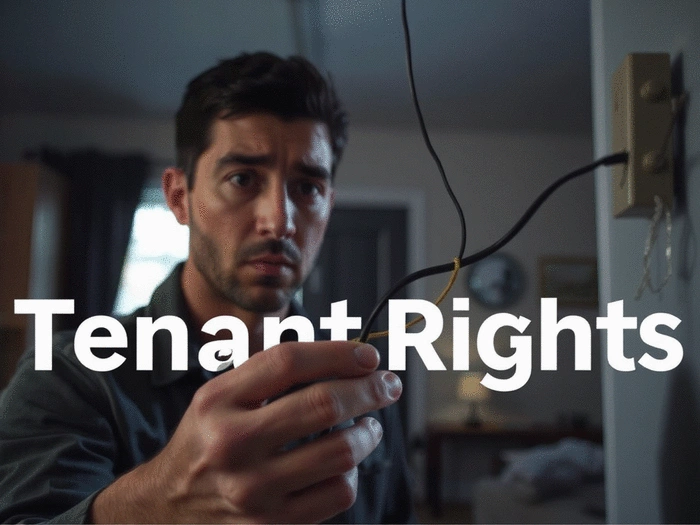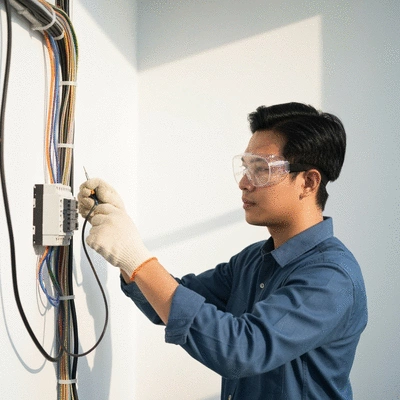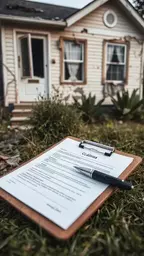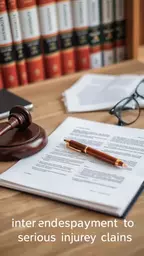Frequent Issues
Circuit breaker trips or blown fuses
Unlock your FREE 'Quick-Start Guide to No Win No Fee Claims' and demystify the legal process.
Posted on: 2025-09-27
By: Sarah Thompson
Understanding the intricacies of electrical safety is vital for any tenant. By recognizing the signs of unsafe electrical wiring, you can protect your home and well-being. Let's uncover the essential insights that every tenant should know to ensure safety and advocate for your rights effectively.
Recognizing the signs of faulty electrical wiring is crucial for any tenant. Below are common signs that indicate you may be dealing with unsafe electrical wiring:
Circuit breaker trips or blown fuses
Flickering or dimming lights without reason
Burning smells or unusual heat from outlets
Discolored or scorched outlets and switches
Exposed wires or frayed insulation
Buzzing or crackling sounds from outlets
As a tenant, safety should be your top priority, especially when it comes to electrical wiring in your living space. Understanding the signs of unsafe electrical conditions can prevent serious accidents and ensure your rights are protected. In this section, we’ll explore how to identify unsafe electrical wiring and what you need to know as a tenant. It's essential to stay informed about potential hazards and your rights. By understanding the basics of electrical safety, you can take proactive steps to safeguard your home and your well-being. For more information on your rights as a tenant regarding property maintenance, consider understanding housing disrepair claims.
Recognizing the signs of faulty electrical wiring is crucial for any tenant. Unsafe wiring can lead to hazardous situations, including electrical fires or shocks. Here are some common signs that indicate you may be dealing with unsafe electrical wiring:
If you notice any of these signs in your home, it’s important to take them seriously. Early intervention can prevent accidents and keep you safe!
It's vital to familiarize yourself with the typical indicators of electrical issues. Some additional signs to watch for include:
If you encounter any of these symptoms, contact your landlord immediately for an inspection!
Electrical safety standards and codes exist to protect tenants and ensure safe living conditions. In the UK, regulations such as the IET Wiring Regulations outline the necessary requirements for electrical installations. These codes help prevent hazards and ensure all electrical work is performed by qualified professionals.
As a tenant, being aware of these standards is beneficial. It allows you to recognize when your landlord is not complying with legal safety requirements.
Electrical contractors play a critical role in maintaining safe electrical systems in rental properties. They are responsible for:
When hiring a contractor, it’s essential to ensure they are qualified and registered with a recognized body. This guarantees that your electrical systems are safe and compliant!
Understanding your rights as a tenant is vital when it comes to dealing with unsafe electrical conditions. The law provides certain protections that empower you to seek necessary changes in your living environment. Let's break down the key aspects of tenant rights in relation to electrical safety.
Generally, tenants have the right to a safe and habitable living environment. This includes:
These rights exist to protect you and ensure you can live comfortably and safely in your home. If you're dealing with issues where your landlord is not meeting their responsibilities for property repairs, it's important to be aware of landlord responsibilities for property repairs.
While general rights apply in most areas, specific regulations can vary by location. It’s important to understand local laws that pertain to electrical safety, as they may provide additional protections. Some regions may have stricter rules requiring landlords to conduct regular safety inspections or make necessary upgrades.
Researching your local laws can empower you to advocate for your rights more effectively!
The Residential Tenancy Act outlines the rights and responsibilities of both tenants and landlords. It provides a legal framework ensuring that tenants can live in safe conditions. Key implications of this act regarding electrical safety include:
Understanding this act is fundamental, as it lays the groundwork for what you can expect from your landlord when it comes to electrical safety!
Did you know? Regularly checking your electrical outlets for signs of wear can save you from potential hazards. Ensure that all outlets are secure and that there are no exposed wires. If you find any issues, document them and inform your landlord immediately!
Common signs include frequent circuit breaker trips, flickering or dimming lights, burning smells from outlets, discolored or scorched outlets/switches, exposed wires, and buzzing or crackling sounds from outlets.
You have the right to a safe and habitable living environment, which includes proper electrical wiring. Your rights generally include timely repairs from your landlord, being informed of hazards, and reporting unsafe conditions without fear of retaliation.
Document everything, including photos and written communication. Notify your landlord in writing immediately. If issues persist, familiarize yourself with local tenant rights and regulations, and consider seeking legal advice or contacting a housing authority or tenant advocacy organization.
Generally, it is the landlord's responsibility to hire qualified electrical contractors to inspect, test, and repair electrical systems to ensure compliance with safety codes. As a tenant, your role is to report the issues.
Yes, if your landlord fails to address dangerous electrical conditions after being properly notified, you may be able to pursue legal action. It is advisable to seek legal assistance from an attorney specializing in tenant rights to understand your options.
As a tenant, it’s essential to know your rights when it comes to unsafe electrical wiring. Understanding these rights empowers you to take action and protect yourself effectively. Remember, landlords have a responsibility to maintain safe living conditions, and you have the right to live in a home free from electrical hazards!
Here’s a summary of your rights and responsibilities as a tenant:
While it can be daunting to navigate these situations, knowing your rights is the first step toward ensuring your safety and well-being.
In summary, your rights as a tenant not only include living in a safe environment but also necessitate that you act responsibly. If you notice any signs of faulty electrical wiring, it’s crucial to document these hazards and communicate them clearly to your landlord. This establishes a record of your concerns, which can be invaluable if legal action becomes necessary.
To protect yourself and your home from unsafe electrical conditions, follow these essential steps:
By taking these proactive measures, you can help safeguard your home and ensure you’re prepared to take the next steps if necessary.
As you navigate the complexities of tenant rights, don’t hesitate to take action! If you encounter unsafe electrical wiring, remember that you’re not alone. Seeking help from professionals can make all the difference!
If you find yourself overwhelmed or uncertain about your next steps, it’s wise to consult with a legal professional. Let’s discuss when it’s appropriate to seek help:
It’s crucial to act swiftly in these situations to protect both your health and your legal rights! For severe cases where you might be considering legal action, understanding how no win, no fee claims work can be beneficial.
When reaching out to attorneys, make sure to choose someone who specializes in tenant rights and housing issues. This will ensure you receive the most relevant and effective advice for your situation.
There are numerous resources available for tenants facing electrical hazards. Consider checking the following:
These resources can help you navigate the complexities of your situation more easily.
Engaging with consumer protection agencies can be a vital step in addressing unsafe conditions. They can help advocate on your behalf and ensure that your rights are upheld. Don’t underestimate the power of these organizations in your journey toward safety!
Here is a quick recap of the important points discussed in the article:
Final content section.



 Did you know that many tenants are unaware of their rights regarding housing disrepair? Understandin
Did you know that many tenants are unaware of their rights regarding housing disrepair? Understandin
 In today's uncertain job market, knowing your rights when it comes to termination is more crucial th
In today's uncertain job market, knowing your rights when it comes to termination is more crucial th
 In the world of serious injury claims, navigating financial challenges can be daunting. Interim paym
In the world of serious injury claims, navigating financial challenges can be daunting. Interim paym